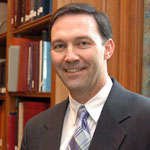Commentary on Psalm 36:5-10
Psalm 36:5-10 contains some of the most beautiful language of any psalm in the Psalter, as many readers have long recognized. Verse 91 has rightly garnered the most attention: “For with you is the fountain of life; in your light we see light.” These words profess faith in God alone as the source and foundation of life, security, and goodness.
Since the profession of faith appears within a prayer for deliverance that sets the righteous and wicked in sharp contrast, many scholars classify the psalm as a prayer for help by an individual. An individual voice appears in verse 11 in the petition “Do not let the foot of the arrogant tread on me.” But the psalm as a whole has more the character of a liturgy in which the worshipping community speaks. The righteous comprise that worshipping community and speak together in verse 9b: “In your light we see light.”
The lectionary reading focuses on the testimony to and prayer for God’s steadfast love. Yet, the division at verse 10 is not altogether logical, and the verses that precede and follow the lectionary reading help put verses 5–10 in context. Therefore, it is helpful to consider the larger context of the reading.
The psalm begins with a description of the wicked, their character bent toward evil (verses 1–4). This description starts with a blanket declaration to the effect that the wicked are guided by a voice that tells them to transgress (verse 1a). The result is that they have no “fear of God” (verse 1b). Following this characterization of the anti-God character of the wicked is a series of more specific statements concerning their actions and activity: They act as though God does not notice their evil deeds (verse 2); their speech is full of mischief and evil plots (verses 3, 4a).
The section ends with another general portrait of the wicked in a pair of statements: Their way is not good; they do not reject evil (therefore, they embrace and continue it; verse 4). The psalm returns to the subject of the wicked at the end with the declaration that destruction is their destiny (verse 12).
The lectionary reading, therefore, presents a confession of God’s goodness (verses 5–9) that provides a foundation for a petition for protection against the wicked (verse 10).
Despite the troubling picture of the wicked and their bent toward evil in verses 1–4, the psalmist expresses confidence in God that overtakes any concerns about the threats of the wicked (verses 5–9). The key term that describes God’s character is “steadfast love” (verses 5, 7, 10). The Hebrew word hesed refers at once to God’s faithfulness and graciousness as well as to God’s caring and protective presence. It is love that is doggedly sure and unfailing. The certainty of God’s provision and care is described in two distinct ways.
First, God’s steadfast love is presented as the stabilizing force in the universe and the key to the world’s cosmic order (verses 5–6). Here hesed is linked with “faithfulness,” “righteousness,” and “judgment” (or justice). In ancient Near Eastern cosmology, the heavens, mountains, and great deep represented parts of the world that had to be held in place for the world to be safe and stable. God’s steadfast love was like the glue that held them together. As a result, all living things (“humans and animals alike,” verse 6b) are kept safe.
Second, God’s hesed is more specifically the source of God’s goodness from which humans may find life and blessings. Verse 7 describes what humans may receive as “refuge,” a term for God’s sheltering care (see Psalms 2:12; 7:1).
“In the shadow of your wings” may refer to the presence of God known symbolically by the outstretched wings of the cherubim on the ark of the covenant in the temple. Whether or not that is accurate, the refuge of God is here linked undeniably to God’s house, the place of worship in Jerusalem (verse 8). Also, refuge is more than just protection or shelter (more than a hiding place from an enemy); it refers to the joy of fellowship with God who is the source of goodness and life (verse 9).
The lectionary reading ends with a petition in verse 10 for God’s steadfast love to continue, but verse 11 expands on the plea by asking God not to allow the wicked to threaten the righteous. God’s faithfulness, in essence, is God’s protection against those who mean to harm the vulnerable.
The psalm then ends with a word of assurance that indeed the doers of evil (the wicked) will not continue to make trouble for the righteous (verse 12). The wicked are “thrust down,” which may refer to their going down to Sheol for punishment. What is certain is that their fate, and their place of destiny, is opposite that of the righteous, who “feast on the abundance of” God’s house (verse 8a).
Notes
- In Hebrew, the verses for Psalm 36:1–12 are numbered 36:2–13. Verse number references in this commentary correspond to the English version, not the Hebrew versification.


January 16, 2022